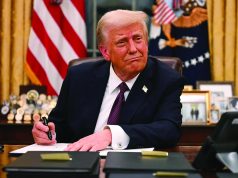In 2016, National League for Democracy (NLD) led by de facto leader Aung San Suu Kyi took power with a laser focus on ending armed ethnic groups that have dogged Myanmar for 50 years or so. The consuming nature of that goal has led to a new problem for the NLD: falling investor confidence in ability to manage a fast-growing $67 billion economy. Economy slowdown in longdisconnected Myanmar has exposed Suu Kyi’s early limitations in running an economy that many had hoped would boom after her civilian-led government replaced a military government and the US lifted longstanding sanctions. Myanmar has huge potential if managed right with a good leadership. Accelerating chorus of investors is questioning the inexperienced government’s strategy after Myanmar’s rate of economic expansion in the latest fiscal year fell to its lowest point since 2011, when the Southeast Asian nation was first emerging from decades of isolation under military rule. Myanmar grossed foreign direct investment value of $6.6 billion in FY2016-2017, which marked the first one-year period the current administration had come to power. The figure resulted in a substantial decrease in FDI inflow if compared to FDI influx of $9.48 billion earned in FY2015- 2016, the final year of the previous administration. Part of the slowdown was supposedly intentional. New leaders caused a slowdown in a dizzying construction boom to apparently review compliance issues and pushed investment away from petroleum and mining to diversify the economy. From time to time while political reforms lead to economic uncertainties, some investors say that Myanmar future is at stake and more risks have to be taken doing business here, in a country desperate to shake off decades of isolation and underdevelopment.
Foreign investors point to circling discussions on electricity investment in a country where blackouts are common and the appointment of key ministers lacking economic backgrounds.
“We have lost some trust in the new government,” said Myo Thet, chairman of wood-furnishings producer Pacific Woodmark Co.,Ltd. “Ongoing transitions in areas such as debt governance and mobile money are taking us from an economy based on connections, relationships and speculation to one based on competition and equal opportunity and business is certainly not on its own in this transition,” said Zaw Htay, a spokesman for the government. “It is crucial to recall where we were when we began this work. Decades of mismanagement and isolation left us with a deteriorating economy when we took office,” he added, adding that the government had “stabilized the unstable situation and set the proper stage for growth.”
Myanmar was one of the richest countries in Southeast Asia following the Second World War, but became one of the poorest under military rule for 50 years, crony capitalism and economic sanctions imposed by the West. The military government started opening in 2010, ultimately allowing elections in 2015 that Suu Kyi’s NLD won. She spent her first year attempting, with little success, to resolve longstanding ethnic conflicts, some of which date back to the end of the Second World War. Suu Kyi has developed a worldwide reputation as a micromanager in this top-down bureaucracy, serving as foreign minister, minister of the president’s office and state counselor. The decision-making process has been a dramatic slowdown,” said Eric Rose, who opened the first American law firm in Myanmar several years ago. “With a few notable exceptions, at the macro level the new government does not have the talent of the old government, unfortunately,” he added.
Aye Lwin, a senior member of Aung San Suu Kyi’s political party and a member of the government-appointed Myanmar Investment Commission, said a weak bureaucracy was partly to blame for slow reform, and that she “cannot focus on all things. “People close to Aung San Suu Kyi say she has begun placing a higher priority on the economy stability, and that changes are in store. The next three months, certainly six months, will see that switch to more growthenhancing policies, “said Sean Turnell, a professor at Macquarie University in Australia and economic adviser to the NLD. There have been signs of a nascent turnaround in economic policy. The government recently issued clarifying investment regulations, cut the number of sectors requiring foreign investors to join with local companies to 22 from 90, and shot down a bill that would have imposed travel and other restrictions on foreigners. In a minor cabinet reshuffle, the government replaced the energy minister and made a well-respected former central banker the deputy finance minister.
Singapore’s Puma Energy in May became the first foreign company allowed to distribute fuel in a market dominated by local companies, and Visa and Mastercard were given the green light to issue credit cards here for the first time. The International Monetary Fund (IMF), meanwhile, forecast that the country will return to higher growth rates of around 7.5 per cent this year, after last year’s 6.3 per cent. Despite the lifting of U.S. sanctions and the market potential of a population of more than 50 million, some American investors have approached Myanmar cautiously. Only two major investors have built up more than token investments in recent years: Coca-Cola, with the initial outlay of more than $170 million so far, and Colorado-based Ball Corp., which opened a $45 million can-making factory last year. Some local businesses and entrepreneurs say they are trying to move forward without government help. In September, Zaw Moe Khine opened the first stage of a $20 million pharmaceutical factory on the outskirts of Yangon — the first such private industry in the country — after paying $300,000 for a high-tension cable to connect him to the main grid. He also pressed on despite the previous government’s decision to raise sales tax on his manufacturing and increase duties on imported packaging he needs, things he had hoped the new government would change. “Friends in the pharmaceuticals industry say I’m crazy,” he said, adding that eight others with permits to build drug factories canceled their plans. “But I’m a long-term player. It might take years to change [the system], but somebody must prove to them that…Myanmar can have an international-standard factory. “It would be more effective if the government had a clearer master plan for dynamic economy in Myanmar, Zaw added. But that, he said, “depends on the NLD”.
All’s well that Ends well
In Myanmar’s case it is particularly serious because the country needs strong economic growth to make inroads into unemployment, which currently stands at more than 25.7 per cent. Myanmar desperately needs a buoyant economy for other reasons too. The first is that the living standards of its citizens cannot improve without economic growth. The second is that the economy needs to grow for the government to be able to boost revenue to meet its growing social welfare budget. Repaid economic growth depends on investment, which in turn is dependent on confidence and positive expectations of the country’s future. It seems that the current administration does not instill confidence. This partly explains subdued investment. Fragile infrastructure has made Myanmar a less attractive investment destination. Investment is required to get Myanmar out of its depressed economic conditions and it will boost demand in the economy with positive spill-over effects into a number of sectors. Only time will tell, however, what inheritance the current government will leave on Myanmar. For now, the world is waiting and hoping the best. Obviously, policies and technical fundamentals drive economic growth, but so do politicians and their tongues. Myanmar may look to be on the right path to a prosperous future and a fast-growing and dynamic economic economy if managed right. All will depend on the current government.










